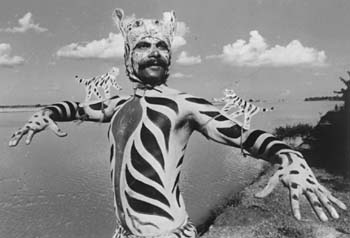Tacky Tracks
Tourism reshapes the world in unpredictable ways
By Andrew Lam
THE CU CHI TUNNELS OUTSIDE Saigon, once headquarters of the Vietcong in their guerrilla war against the U.S.-backed South Vietnamese government, have been re-dug and expanded to hold more heavy-set visitors from abroad. After a half-hour guided tour, tourists emerge at a conveniently located gift shop and a shooting range where, for a dollar a pop, one can shoot at various animal-shaped metal targets lurking in the tall elephant grass.
Tourism is on the rise. It is the No. 1 source of foreign revenue for many countries (including the United States), employs more than 200 million people worldwide--about one in nine of all workers--and accounts for 11 percent of all consumer spending.
The growth of tourism was predictable. What no one imagined was how it would reshape the world, not just by fueling economies but by preserving traditions not necessarily with taste.
Perhaps tackiness cannot be helped. The global village, after all, must consider a multitude of conflicting desires: the impoverished Vietnamese want cash, the tourist wants to feel like a guerrilla.
And tourism does have its inspiring aspects. A Japanese tourist crying at Graceland, Elvis' shrine in Memphis, is no less poignant than an American pacifist weeping at the place where Gandhi was assassinated in India.
We have come to mean something to each other in the global village, and it is a small, good thing.
As for those new and improved Cu Chi tunnels, certainly they serve a more benign purpose now. Not far away--an hour or so to the West by air--lies another tourist site: the killing fields of Cambodia with their mounds of human skulls, remnants of the Khmer Rouge handiwork. The site reminds visitors of what we are capable of beyond mere tackiness.
Tourism has also done some environmental good. In Rwanda, before that county's recent civil unrest, rising demand for ecotourism led the government to scrap its plan to cut down the forest habitat of gorillas--instead, it charged tourists $170 an hour to see these gentle giants at play in what is now a national forest. Costa Rica's spectacular rain forest has not been cleared for cattle grazing (as in neighboring countries) largely because tourism is seen as more important than cattle. And many ruins--Angkor Wat in Cambodia, the Valley of the Temples in Burma--are being restored and polished in hope of the tourist dollar.
As for traditions, the aborigines of Australia are experiencing a renaissance. Demands for their spiritual paintings surge, and many younger artists are responding with vigor, in the process inventing new techniques and styles. In Bali, all young people must learn their dances the way children learn their time tables. But Balinese youngsters take up their arts with the awareness that their dance is more lucrative than math--tradition aside, tourists flock to see them perform.
Why travel? Why trudge abroad when we can be, as Paul Russel puts it, "stationary tourists," logging onto the internet and surfing the world in the comfort of our bedroom? The cynics would contend that the going is not worth the fare anymore, that paradise is lost.
We travel out of necessity, of course. To trade, to conquer, to proselytize, to discover new homes. But we also travel for a deeper reason. Bruce Chatwin, the late travel writer, theorized that we are born to travel-- restlessness is a human impulse, a constant ache in the soul.
But most importantly, we travel to find ourselves. The world may have been discovered long ago, but not one's place in it. One watches gorillas play in their habitat or one descends into dank and dark tunnels to imagine his or her own life lived otherwise. And sometimes, the traveler emerges a bit wiser from the experience, with a story or two to tell if and when home becomes the final stop.
Copyright © Metro Publishing Inc. Maintained by Boulevards New Media.
![]()

Stripe Up the Ban: In some cultures, the crush for money is so great that the cheap side of tourism gains the upper hand.
From the May 7-13, 1998 issue of Metro Santa Cruz.
![[MetroActive Travel]](/gifs/travel468.gif)